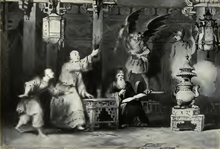314 TWENTIETH CENTURY IMPRESSIONS OF HONGKONG, SHANGHAI, ETC.
claim to efficiency in their methods, and though there is a substratum of practitioners employing witchcraft and the black arts, doctors of the better class aver that their percentage of cures is very high. In the case of small-pox, for instance, they guarantee 90 per cent, of cures — the European percentage is barely as high as 70. The outstanding name on the medical roll is that of Wa To, who lived in the Han dynasty. He used the knife freely, both for amputations and for minor operations, and obtained great repute. He has now been canonised, or deified, and is worshipped as the god of medicine.
RELIGIONS.

Chinese religions and their inter-relationship with each other and with national social observances are dealt with at some length in another part of this volume, but as no article on the "Manners and Customs of the Chinese" would be complete without some reference to the people's beliefs, a passing allusion to them may here be permitted. As a general rule Chinese religions are regarded as three in number, namely, Confucianism, Taoism, and Buddhism, and into these is woven the all-prevalent ancestor-worship. Whatever its creed or conglomeration of creeds, every family or clan has its temple, in which are placed the tablets of the dead, supposed to be inhabited by the souls of departed ancestors; and in every house there is a hall set aside for the observance of the prescribed ceremonials, whereby the hovering spirits are propitiated.
Strictly speaking, it is a mistake to class Confucianism as a religion, for its founder — politician, economist, philosopher, and moralist — professed to teach only the ethics of right conduct and temporal welfare, and consistently evaded his disciples' inquiries concerning a future existence. "You do not understand life yet ; how can you hope to understand death?" he would ask. He refrained from discussing the problem; he rarely, if ever, spoke of gods and spirits; and even when he was ill he refused to offer up prayers, though urged to do so by one of his followers.
Taoism is a religion, because it speaks of a higher existence. Laotzv is looked upon as the founder of Taoism, though it is practically certain that the religion, which consists in the following of Tao, or "the right principle," really existed prior to his time. He was a contemporary of Confucius, and the latter often questioned him concerning the principle he advocated.
The introduction of Buddhism to China dales from the Han dynasty. It is said that one of the Han emperors, having dreamed that he saw a giant with a golden body, preaching a new religion, sent an ambassador to make inquiries. The ambassador, falling in with Buddhist priests in India, invited them to China. Both Taoism and Buddhism have degenerated, and are losing their hold on the minds of the people. Each religion has borrowed from the other doctrines, formulas, and observances which have won popular support or which have been favourably received by successive emperors ; but, with changing times and the spread of enlightenment, these devices are proving futile, and both religions are hastening to decay.
This assimilation by the various religions of the essential features of others has made it practically impossible for it to be said that the Chinese belong to any particular religion. In reality Chinamen are pantheistic, and believe just as much as they please of as many religions as they please. There are innumerable minor deities, each having its own sphere of activity, beneficent or malign. For example, a medical man would worship Wa To, the god of medicine ; while carpenters and others would sacrifice to Lo Pan, formerly an officer of the Public Works Department, and now deified as the god of architecture and building construction. Soldiers have Kwan Tai, their god of war; men of letters, Wun Chang, the god of literature; and so forth. Belief in a future existence is general. Somewhere in the centre of the earth there is said to be a region ruled by a king, or, according to some, by ten kings, where the deeds of men are weighed, and reward or punishment is meted out accordingly. The good will return to earth as great men, blessed with riches, honour, long life, and children ; the less worthy will enjoy similar happiness, but in a lower degree ; the evil will suffer privation and hardships of all kinds ; while those guilty of rebellion, murder, disobedience to parents, and other heinous offences will take the shape of horses, cattle, wild beasts, or some other animal.
The conversion of the adult Chinese to Christianity makes slow progress, and the reason is not far to seek. Usually, the Chinese display an easy tolerance of all religions, but there were, and still are, certain rules enjoined by Christianity which make it very difficult for the Chinese to embrace the faith. For instance, ancestral worship is prohibited, and monogamy is strictly enjoined. Thus, when a man who has taken to himself a wife and a handmaid desires to become a
